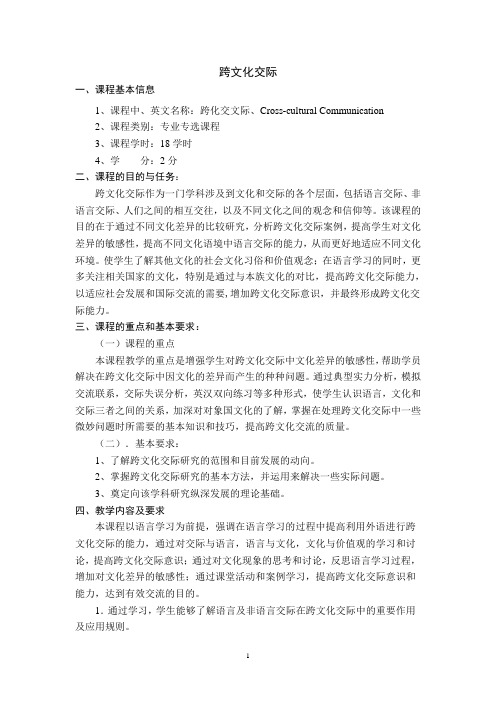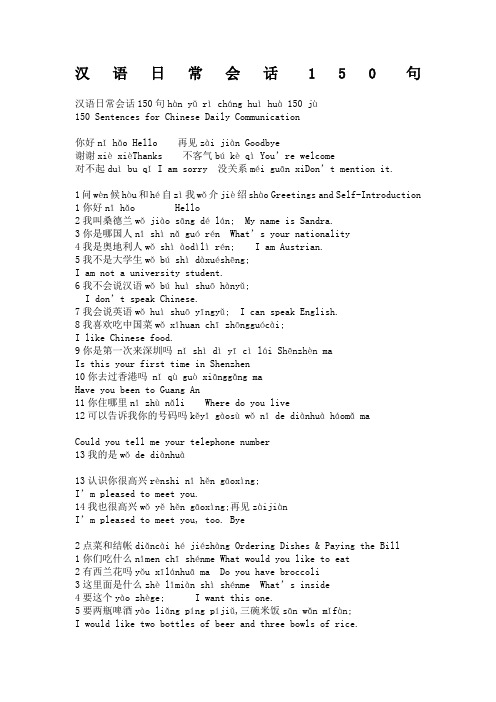Daily Communication 1
跨文化 Unit 3

Unit 3 Daily Verbal Communication (Ⅱ)
9
Unit 3 Daily Verbal Communication (Ⅱ)
01 Warm-up Cases 02 Compliments and Compliment Responses 03 Social Functions of Compliments 04 Differences Between CCs and ECs 05 Common Response Formulas of ECs and CCs 06 Cultural Assumption 07 Expressions of Gratitude and Apology
Unit 3 Daily Verbal Communication (Ⅱ)
6
01 Warm-up Cases
Case The Embarrassment Caused by “No Etiquette” (P46)
p No help for Old People
My landlady was over 70 and we got along very well. Once when we were ascending[ə'sɛnd](攀登) the stairs together, I stretched out my hands to give her some help. She said, “I can do it. Thank you.” I thought she was just being polite, so I escorted['ɛskɔt](护送 ) her to the top floor. Her face showed that she could do nothing about my over-kindness. Soon after, I saw her going up the stairs alone, I forgot my previous lesson and practiced “Lei Feng” once again. This time, half-jokingly and half-seriously, she asked me, “Young man, do you think I am old and useless? When I have to move myself on a wheelchair, I’ll ask you for help.” I stood there, blushed and puzzled. (Translated from China Commercial News, July 8,2001)
大学英语跨文化交际U3 课文案例+词汇习语整理

U3 Daily Verbal Communication一、案例Case 1美国爸爸和女儿来到菲律宾,举行首次领圣餐仪式,叫了菲律宾朋友,他不置可否,后来却去了别的朋友之间聚会。
美国人觉得很不尊重领圣餐仪式,因此关系不好了起来。
Comment:美国人把这种仪式,特别是关于自己的孩子的看的很重要;而菲律宾朋友忽略了美国人的习俗,而且清点人数是美国人开party 前要做的,为了确保食物数量。
Case 2新西兰人在公开场合对他的菲律宾朋友进行建议和批评,让他下不来台。
他的菲律宾朋友十分生气,并且取消了晚上的一起吃饭。
Comment:在菲律宾,不可以当面指出别人的错误(面子、);在新西兰,被看成是十分正常的。
选项:Jose thought that Stans actions during the meeting were not those of a true friendCase 3菲律宾夫妇遇见了英国熟人,又遇见了自己的菲律宾朋友,并且大声地用自己的语言进行寒暄,英国人因此十分不悦。
选项:He thought the Filipinos were very rude for introducing him to their friend.Case 4在澳大利亚“no etiquette”customno seeing out when guests leaves;no stand-up when leaders come in;no help for old people专题:Compliments and compliment responsesExamples:1.中国女士买了条裙子,美国女士说好看,中国女士说哎呀一般般;2.美国女主人向别人介绍中国学者,夸赞,中国学者却笑着说你不是真的这个意思?3.中国式谦虚反映了:1.the taste of the American lady is questionable,and poor judgement2.the hostess is not sincere3.“fishing for compliments”沽名钓誉,别人会接着夸你Social functions of complimentssituations: range from formal to casualIn formal situations—reinforce solidarity,connected with the appreciation of something that has been done to the speaker(尼克松访华:感谢中国人的好客和款待)In informal situations —achieve solidarity;make people feelcomfortable体现在:greeting people;expressing thanks ;getting over embarrassmentDifferences between Chinese and English compliments美国,女人不主动夸男人,但是男士应该通俗的对女士的打扮和衣着进行赞美但是在中国,如果男士夸奖女士,会被认为是调情,不尊重。
跨文化交际(含教案)(高中英语选修课)

跨文化交际一、课程基本信息1、课程中、英文名称:跨化交文际、Cross-cultural Communication2、课程类别:专业专选课程3、课程学时:18学时4、学分:2分二、课程的目的与任务:跨文化交际作为一门学科涉及到文化和交际的各个层面,包括语言交际、非语言交际、人们之间的相互交往,以及不同文化之间的观念和信仰等。
该课程的目的在于通过不同文化差异的比较研究,分析跨文化交际案例,提高学生对文化差异的敏感性,提高不同文化语境中语言交际的能力,从而更好地适应不同文化环境。
使学生了解其他文化的社会文化习俗和价值观念;在语言学习的同时,更多关注相关国家的文化,特别是通过与本族文化的对比,提高跨文化交际能力,以适应社会发展和国际交流的需要,增加跨文化交际意识,并最终形成跨文化交际能力。
三、课程的重点和基本要求:(一)课程的重点本课程教学的重点是增强学生对跨文化交际中文化差异的敏感性,帮助学员解决在跨文化交际中因文化的差异而产生的种种问题。
通过典型实力分析,模拟交流联系,交际失误分析,英汉双向练习等多种形式,使学生认识语言,文化和交际三者之间的关系,加深对对象国文化的了解,掌握在处理跨文化交际中一些微妙问题时所需要的基本知识和技巧,提高跨文化交流的质量。
(二).基本要求:1、了解跨文化交际研究的范围和目前发展的动向。
2、掌握跨文化交际研究的基本方法,并运用来解决一些实际问题。
3、奠定向该学科研究纵深发展的理论基础。
四、教学内容及要求本课程以语言学习为前提,强调在语言学习的过程中提高利用外语进行跨文化交际的能力,通过对交际与语言,语言与文化,文化与价值观的学习和讨论,提高跨文化交际意识;通过对文化现象的思考和讨论,反思语言学习过程,增加对文化差异的敏感性;通过课堂活动和案例学习,提高跨文化交际意识和能力,达到有效交流的目的。
1.通过学习,学生能够了解语言及非语言交际在跨文化交际中的重要作用及应用规则。
unit 3 Daily Verbal Communication (2) 跨文化交际复习指导资料

Fish for Compliments
“ I really know little about the subject.” -----
“Oh, come on. I know you’re an expert on Chinese art. ”
“Well, I certainly don’t know anybody who knows more than you do!”
14
Social Functions of Compliments
1. Creating or reinforcing solidarity 2. Greeting people 3. Expressing thanks or congratulations 4. Encouraging people 5. Softening criticism 6. Starting a conversation 7. Overcoming embarrassment
8
Case 2. The Cancellation of the Dinner Party
Question
Why did Jose cancel the dinner party?
Comment: 1. In New Zealand, a friend can openly provide constructive criticism. Stan took this for granted, as it is a common practice among Westerners. In fact, if Stan did not make such suggestions to a friend in his country(these suggestions are helpful in the long term), the friend would be angry that Stan did not help him when he had the chance.
七年级下册英语1到3单元综合作文

七年级下册英语1到3单元综合作文全文共3篇示例,供读者参考篇1Title: My Reflection on Units 1-3 in Seventh Grade English BookDuring the past few months, I have been studying the English book for seventh grade, focusing on units 1 to 3. These units cover a wide range of topics, from daily routines to hobbies, and from food preferences to travel experiences. In this reflection, I would like to share my thoughts on the key points I have learned in these units.In unit 1, we learned how to describe our daily routines and activities. I found it interesting to learn new vocabulary related to daily activities, such as "make the bed", "have breakfast", and "brush teeth". By practicing these words in class and using them in conversations with my classmates, I have improved my ability to express my daily routines in English.Unit 2 focused on hobbies and interests. I enjoyed learning about different hobbies that people around the world enjoy, such as painting, playing musical instruments, and gardening. Ialso learned how to ask and answer questions about hobbies, which has helped me to have more meaningful conversations with my friends and family members.In unit 3, we explored the topic of food preferences and eating habits. I learned how to talk about my favorite foods, as well as how to order food in a restaurant. This unit has been particularly useful for me, as I now feel more confident when ordering food in English-speaking countries or when interacting with English-speaking waiters and waitresses.Overall, studying units 1 to 3 in the seventh grade English book has been a rewarding experience for me. I have not only learned new vocabulary and grammar structures, but I have also improved my communication skills in English. I look forward to continuing my studies and building on the knowledge I have gained in these units.In conclusion, I am grateful for the opportunity to study the English book for seventh grade and to learn about daily routines, hobbies, and food preferences. I believe that the knowledge and skills I have gained in these units will benefit me in my future studies and in my everyday life.篇2Unit 1-3 in Grade 7's second semester English class covers a wide range of topics, from daily routines to hobbies and interests. In this essay, we will explore the key points and skills learned in these units and reflect on how they can be applied in real-life situations.Unit 1 focuses on daily routines and time expressions. Students learn how to talk about their daily activities using verbs like "get up", "have breakfast", and "go to school". They also practice telling the time using phrases like "at seven o'clock" and "before noon". This unit helps students develop essential vocabulary and grammar skills for describing their everyday lives.Unit 2 shifts the focus to hobbies and interests. Students learn how to talk about activities they enjoy doing in their free time, such as playing sports, listening to music, and reading books. They also practice expressing their preferences using phrases like "I prefer" and "I like to". This unit encourages students to explore new hobbies and share their interests with others.In Unit 3, students learn about food and drinks. They study vocabulary related to different types of food, such as fruits, vegetables, and desserts. They also practice ordering food in a restaurant and discussing their favorite dishes. This unit helpsstudents expand their culinary knowledge and improve their communication skills in social settings.Overall, the topics covered in these three units provide a solid foundation for students to communicate effectively in English. By mastering the vocabulary, grammar, and expressions learned in class, students can confidently talk about their daily routines, hobbies, and food preferences with others. These skills are invaluable in both academic and real-life situations, as they enable students to express themselves clearly and connect with people from different backgrounds.In conclusion, the comprehensive curriculum of Grade 7's second semester English class equips students with essential language skills for daily communication. The topics covered in Units 1-3 help students build a strong foundation in English vocabulary, grammar, and expressions. By practicing these skills regularly, students can improve their English proficiency and engage in meaningful conversations with others. The knowledge gained in these units will not only benefit students academically but also enrich their personal and social lives.篇3Unit 1 - My School LifeIn the first unit of our textbook, we learned about school life. We talked about different subjects, classroom rules, and school activities. Through this unit, we learned how to talk about our school life and daily routines.I really enjoy my school life. I have a lot of fun with my friends, and I love learning new things every day. My favorite subject is English because I find it interesting and enjoyable. I also like math because I think it's fun to solve problems and learn new concepts.In our school, we have a lot of rules to follow, such as always being on time for class, not talking when the teacher is speaking, and respecting our classmates. These rules may seem strict, but they help us create a positive and respectful learning environment.Apart from studying, our school also offers various extracurricular activities like sports, art, and music. I like to participate in the school choir because I love singing and performing on stage. It's a great way to develop my talents and make new friends.Overall, I feel grateful for the opportunity to go to school and receive a good education. I know that my school life is preparing me for a bright future, and I will always cherish thememories and experiences I have gained in these formative years.Unit 2 - My HobbiesIn the second unit of our textbook, we talked about hobbies. Hobbies are activities that we do for fun and relaxation in our free time. They help us reduce stress, improve our creativity, and connect with others who share the same interests.I have several hobbies that I enjoy doing. One of my favorite hobbies is reading. I love getting lost in the world of books and exploring different stories and characters. Reading allows me to relax and escape from the stress of daily life.Another hobby I have is painting. I find it therapeutic to express myself through art and unleash my creativity on a canvas. Painting allows me to relax and unwind while also honing my artistic skills.In addition to reading and painting, I also enjoy playing sports. I like to play basketball with my friends and participate in school competitions. Playing sports not only keeps me physically active but also helps me build teamwork and sportsmanship skills.Hobbies play a crucial role in my life as they provide me with joy, relaxation, and a sense of fulfillment. I believe that everyone should have hobbies that they enjoy and make time for them in their busy schedules.Unit 3 - My FamilyIn the third unit of our textbook, we learned about family. Family is the most important aspect of our lives, providing love, support, and a sense of belonging. In this unit, we talked about our family members, their roles, and the importance of family relationships.I am very close to my family, and I cherish the time I spend with them. My family consists of my parents, my younger sister, and my grandparents. We share a strong bond and always support each other through thick and thin.My parents play a vital role in my life. They provide me with love, guidance, and encouragement to pursue my dreams. They work hard to ensure that my sister and I have everything we need and are always there for us when we need advice or a shoulder to lean on.My sister is my best friend. We share everything with each other, from our secrets to our joys and sorrows. We playtogether, study together, and always have each other's backs no matter what.My grandparents are also an essential part of my family. They shower us with love and wisdom, sharing stories and experiences from their lives. I have learned a lot from them, and I treasure the time I spend listening to their tales and learning from their wisdom.In conclusion, family is a precious gift that we should always cherish and appreciate. My family is my rock, my support system, and my source of love and happiness. I am grateful for their presence in my life and will always hold them close to my heart.Overall, these first three units have been very enriching and have taught me a lot about school life, hobbies, and family. I look forward to learning more in the upcoming units and continuing to grow and improve my English skills. Learning English is not just about mastering a language, but also about understanding different cultures, perspectives, and ways of life. I am excited to continue my English journey and expand my horizons further.。
汉语日常会话句

汉语日常会话150句汉语日常会话150句hàn yǔrìcháng huìhuà 150 jù150 Sentences for Chinese Daily Communication你好nǐhǎo Hello 再见zài jiàn Goodbye谢谢xièxièThanks 不客气búkèqì You’re welcome对不起duì bu qǐ I am sorry 没关系méi guān xiDon’t mention it.1问wèn候hòu和hé自zì我wǒ介jiè绍shào Greetings and Self-Introduction 1你好nǐhǎo Hello2我叫桑德兰wǒjiào sāng délán; My name is Sandra.3你是哪国人nǐshìnǎguórén What’s your nationality4我是奥地利人wǒshìàodìlìrén; I am Austrian.5我不是大学生wǒ bú shìdàxuéshēng;I am not a university student.6我不会说汉语wǒbúhuìshuōhànyǔ;I don’t speak Chinese.7我会说英语wǒhuìshuōyīngyǔ; I can speak English.8我喜欢吃中国菜wǒxǐhuan chīzhōngguócài;I like Chinese food.9你是第一次来深圳吗nǐshìdìyīcìlái Shēnzhèn maIs this your first time in Shenzhen10你去过香港吗nǐqùguò xiānggǎng maHave you been to Guang An11你住哪里nǐzhùnǎli Where do you live12可以告诉我你的号码吗kěyǐgàosùwǒnǐ de diànhuàháomǎ maCould you tell me your telephone number13我的是wǒ de diànhuà13认识你很高兴rènshi nǐhěn gāoxìng;I’m pleased to meet you.14我也很高兴wǒyěhěn gāoxìng;再见zàijiànI’m pleased to meet you, too. Bye2点菜和结帐diǎncài héjiézhàng Ordering Dishes & Paying the Bill1你们吃什么nǐmen chīshénme What would you like to eat2有西兰花吗yǒu xīlánhuā ma Do you have broccoli3这里面是什么zhèlǐmiàn shìshénme What’s inside4要这个yào zhège; I want this one.5要两瓶啤酒yào liǎng píng píjiǔ,三碗米饭sān wǎn mǐfàn;I would like two bottles of beer and three bowls of rice.6米饭跟菜一起上mǐfàn gēn cài yìqǐshàng;I would like to have the dishes served along with the rice. 7还要什么hái yào shénme Anything else8就要这些jiùyào zhèxiē; That is all I want.9不要了búyào le; I don’t want anything else.10我们不吃肉wǒmen búchīròu; We don’t eat meat.11再来一瓶可乐zài lái yī ping kělè One more cola, please12请等一下儿qǐng děng yíxiàr; Wait a minute, please.13买单mǎi dān The bill, please14要发票yào fāpiào; I would like a receipt.15可以打包吗kěyǐdǎbāo maCan you pack the leftover food for me3买东西mǎi dōngxīShopping1您要买什么nín yào mǎi shénmeWhat would you like to buy2我看看wǒkànkan; I’m just having a look.3这个多少钱zhège duōshǎo qián How much is this4打折吗dǎz hé ma Is there any discount5太贵了tài guìle It’s too expensive6便宜一点儿行吗piányi yìdiǎn r xíng maCould you give me a reduction7是不是真丝的shì bu shìzhēnsī de Is it pure silk8有大一点儿的吗yǒu dàyìdiǎn r de maDo you have a larger one9还有别的颜色吗háiyǒu biéde yánsè maDo you have it in any other colors10你穿多大的nǐchuān duōdà de What size do you take11有没有更好的yǒu meiyǒu gènghǎo deHave you get a nicer one12能换一个吗néng huàn yígè maCould you let me see another one13这是什么材料做的zhèshìshénme cáiliào zuò deWhat is made of14我喜欢这条裤子wǒxǐhuan zhètiáo kùzǐ; I like this trouser. 15可以试试吗kěyǐshìshì ma May I try it on4.打车dǎchē Take a taxi1你要去哪里nǐyào qùnǎli Where are you going2去超市qùchāoshì; I’m going to supermarket.3请开一下后备箱qǐng kāi yíxiàhòubèixiāng;Please open the trunk4你知道怎么去深圳大学吗nǐzhīdào zěnme qù Shēnzhèn dàxué maDo you know how to get to the Shenzhen University5请快一点qǐng kuài yìdiǎn; Please go a little faster. 6我有急事wǒyǒu jíshì; I’m in a hurry7请你不要太快,我害怕qǐng nǐbúyào tài kuài,wǒhàipà;Please don’t go too fast, I’m scared.8大概要多长时间dàgài yào duōcháng shíjiānRoughly how long does it take9四点能到吗sìdiǎn néng dào ma Can we arrive by 4 o’clock 10你能停一下吗nǐnéng tíng yíxià maCan you stop for a short while11你能等我十分钟吗nǐnéng děng wǒshífēnzhōng maCan you wait for me about 10 minutes12你有一块钱吗nǐyǒu yíkuài qián ma So you have one Yuan 13去飞机场多少钱qùfēijīchǎng duōshǎo qiánHow much does it cost to get to the airport14到了,下车吧dào le,xiàchē baHere we are. You may get out.15对不起duìbuqǐ,我没带零钱wǒméi dài língqián;Sorry, I do not have any small change on me.5.问路wènlù Asking for Directions.1请问qǐng wèn,邮局在哪里yóujúzài nǎliExcuse me, where is the post office2 怎么去购物公园zěnme qùgòuwù gōngyuánHow do we get to the Shopping Park3洗手间在什么地方xǐshǒujiān zài shénme dìfāngWhere is the restroom4这儿附近有饭馆吗zhèr fùjìn yǒu fànguǎn maAre there any restaurants near here5哪儿有网吧nǎr yǒu wǎngbāWhere can we find an Internet bar6哪儿可以发传真nǎr kěyǐfāchuánzhēnWhere can I send a fax7去书城怎么走qù shūchéng zěnme zǒuHow can I get to Book City8这趟车去不去机场zhè tàng chēqù bú qùjīchǎngDoes this bus go to airport9向前走xiàng qián zǒu; Go straight ahead.10往左拐wǎng zuǒguǎi; Turn left.11你得去马路对面上车nǐ děi qùmǎlùduìmiàn shàngchē;You have to cross the road to take the bus;12这是什么地方zhèshìshénme dìfāng What place is this13我们现在在哪里wǒmen xiànzài zài nǎli Where are we now14这边还是那边zhèbiān háishìnàbiānThis side or the other side15 去火车站在哪里下车qù huǒ chēzhàn zài nǎli xiàchēWhere do I get off for train Station6.问时间wèn shíjiān Asking the Time1现在几点xiànzài jǐdiǎn What time is it now2今天几号jīntiān jǐhào What is the date today3明天星期几míngtiān xīngqījǐ What day is tomorrow4你什么时候有空nǐshénme shíhòu yǒukòngWhen do you have free time5周末我没有时间zhōumòwǒméiyǒu shíjiān;I do not have free time at the weekend.6你们从几点到几点上班nǐmen cóng jǐdiǎn dào jǐdiǎn shàng bānWhen do you start and finish work7我明天九点来找你wǒmíngtiān jiǔdiǎn lái zhǎonǐ;Tomorr ow at nine o’clock I’ll come to meet you.8请你今天晚上八点以后给我打qǐng nǐjīntiān wǎnshang bādiǎn yǐhou gěi w ǒ dǎdiànhuà;Please give me a telephone call after 8 p.m this evening.9你等了多久了nǐděng le duōjiǔ leHow long have you been waiting10我们在这儿学习一个月wǒmen zài z hèr xuéxíyígèyuè;We will study here for one month.11火车几点开huǒchējǐdiǎn kāiWhat time dose the train leave12飞机什么时候起飞fēijīshénme shíhòu qǐfēiWhen dose the plane take off13明天几点到上海míngtiān jǐdiǎn dào shànghǎiWhat time will you arrive in Shanghai tomorrow14你们哪天回国nǐmen nǎtiān huíguóWhen will you return to your country15你打算什么时候再来nǐdǎsuan shénme shíhòu zài láiWhen do you intend to come back7寄信和明信片jìxìn hémíngxìnpiànSending Letters and Postcards1我要寄一封信wǒyào jìyīfēng xìn; I would like to send a letter. 2挂号信还是平信guàhào xìn háishìpíngxìnIs it a registered or surface letter3寄到美国要多少钱jìdào měiguóyào duōshǎo qiánHow much does it cost to send it to America4买五张八毛的邮票mǎi wǔzhāng bāmáo de yóupiào;I want to buy five 8-mao stamps.5寄一张明信片多少钱jì yì zhāng míngxìnpiàn duōshǎoqiánHow much dose it cost to send a postcard6到奥地利dàoàodìlì,不是澳大利亚búshìàodàlìyà;Please send it to Austria, not Australia.7这儿能寄包裹吗zhèr néng jìbāoguǒ maCan I send parcels here8里面是礼物lǐmiàn shìlǐwù; There are presents inside it.9还用看吗hái yòng kàn ma Do you still need to check it10打开看一下dǎkāi kàn yíxià;Please open it and let me have a look.11有好看的邮票吗yǒu hǎokàn de yóupiàom aDo you have any beautiful stamps12特快专递得多少钱tèkuài zhuāndì děi duōshǎo qiánHow much is it by express delivery13什么时候能到shénme shíhòu néng dàoWhen will it be delivered14给我一张包裹单gěi wǒ yì zhāng bāoguǒdān;Give me a parcel form, please.15我们这儿的邮政编码是多少wǒmen zhèr de yóuzhèng biānmǎshìduōshǎo What is the post code of this area8打dǎdiànhuà Making Te lephone Calls1喂wéi,找谁zhǎo shuí Hello Who are you looking for2请问qǐng wèn,桑德拉sāng dé lāzài maExcuse me, is Sandra there3她现在不在tāxiànzài bùzài; She is not here right now.4你打nǐ5打错了dǎcuòle; You’ve got the wrong number.6占线zhàn xiàn; The line is busy.7没人接méi rén jiē; Nobody answered.8大堂吗dà táng ma请接912号房间qǐng jiē jiǔ yāo èr hào fángjiān;Is that receptionPlease put me through to Room 912.9能转告他吗néng zhuǎngào tā maCan you take a message10可以留言吗kěyǐliúyán ma Can I leave a message11请他给我回,号码是qǐng tāgěi wǒhuídiànhuà,hàomǎshì……Ask him to call me back. My number is …12请你过一会再打来qǐng nǐguòyìhuìzài dǎlái;Please call again in a few minutes.13我听不见wǒtīng bùjiàn; I can’t hear you.14请你大声点儿qǐng nǐdàshēng diǎn r; Louder, please.15你可以打他的nǐkěyǐdǎtā de shǒujī;You may call him on his mobile phone.9 请求帮助qǐngqiúbāngzhùAsking for help1对不起duìbuqǐ,我要下车wǒyào xiàchē;Excuse me, I want to get off.2你能帮我一个忙吗nǐnéng bāng wǒyígèmáng maCan you do me a favor3麻烦你帮帮我吧máfan nǐbāngbāng wǒbaCould you help me4你有什么事nǐyǒu shénme shì What can I do for you5你怎么了nǐzěnme le What’s the matter6请送我去医院qǐng song wǒqùyīyuàn;Please take me to the hospital.7请帮我打qǐng bāng wǒdǎ110;Please call the police on 110.8快叫警察kuài jiào jǐngchá Call the police immediately9救命jiùmìng Help10怎么办zěnme bàn What can I do11我迷路了wǒmílùl e; I’m lost.12我的车票丢了wǒ de chēpiào diūle;I have lost may train/bus ticket.13可以用一下你的吗kěyǐyòng yíxiànǐ de diànhuà maMay I use your telephone14你真是太好了nǐzhēnshìtàihǎo le; That’s very kind of you. 15非常感谢fēicháng gǎnxiè Thank you very much indeed10 告别gàobié Saying Goodbye1时间过得真快shíjiān guòdézhēn kuài; Time dose fly.2我们来跟您告别wǒmen lái gēn nín gàobié;We have come to say goodbye to you.3这是一个小礼物zhèshìyígèxiǎo lǐwù,请收下qǐng shōuxià; This is a small gift, please accept it.4希望你喜欢xīwàng nǐxǐhuan; Hope you like it.5你给了我很多帮助nǐgěi le wǒhěnduōbāngzhù;You’ve given me a lot of help.6感谢你为我们做的一切gǎnxiènǐ wèi wǒmen zuòde yíqiè;Thank you for everything you have done for us.7希望以后还能再见面xīwàng yǐhòu háinéng zài jiànmiàn;Hope we’ll see each again.8希望能再来这儿学习xīwàng néng zài lái zhèr xuéxí;I hope I can come here to study again.9能给我您得联系地址吗néng gěi wǒnín de liánxìdìzhǐmaCould you give me your address10你有电子邮件地址吗nǐyǒu diànzǐyóujiàn dìzhǐ maDo you have an e-mail address11你有机会来我国一定告诉我nǐyǒu jīhuìlái wǒguóyídìng gàosù wǒ; If you have a chance to come to my country, do let me know.12请你一定给我写信qǐng nǐyídìng gěi wǒxiěxìn;Please do write to me.13我会想你的wǒhuìxiǎng nǐde; I’ll miss you.14保持联系bǎochíliánxì; Keep in touch.15友谊地久天长yǒuyìdìjiǔtiāncháng;May our friendship last forever.。
四年级下册英语课件Unit 2 Cities Lesson 3∣人教新起点(秋) (共14张PPT)
谢谢观看!
New words
place 地方 thing 东西 stay 停留 star 星星,明星 king 国王
人民教育出版社 四年级 | 下册
central 中央的,中间的 take photos 拍照 museum 博物馆 dream 梦想
read
This city is very interesting. 这个城市很 有趣。 There are many fun places to see and things to do. 有很多有趣的地方可以看 ,也有很多事情做。 Come stay with us at Star Hotel! 来星星 酒店住吧! Our hotel is in the centre of the city. 我 们酒店在城市中心。
You can fly kites and take photos there. 你可以在那里放风筝和照相。 You can go there by bus. 你可以坐公交 到那。
The bus stop is between the hotel and the bookshop. 公交站在酒店和书店中间。
人民教育出版社 四年级 | 下册
•9、要学生做的事,教职员躬亲共做;要学生学的知识,教职员躬亲共学;要学生守的规则,教职员躬亲共守。2021/8/132021/8/13Friday, August 13, 2021 •10、阅读一切好书如同和过去最杰出的人谈话。2021/8/132021/8/132021/8/138/13/2021 10:42:45 PM •11、只有让学生不把全部时间都用在学习上,而留下许多自由支配的时间,他才能顺利地学习……(这)是教育过程的逻辑。2021/8/132021/8/132021/8/13Aug-2113-Aug-21 •12、要记住,你不仅是教课的教师,也是学生的教育者,生活的导师和道德的引路人。2021/8/132021/8/132021/8/13Friday, August 13, 2021
跨文化交际复习Unit-3
2. Daily Verbal Communication
In daily verbal communication, there are many routine ways one must observe in order to maintain smooth cross-cultural interaction. Being unaware of the difference, intercultural communication break-down occurs here and there. With some knowledge of the basic cultural difference, one is likely to survive in other cultures.
When in Rome, do as the Romans do. ---- English Proverb
Warm-up:Case study
Case 1--- Have you had your lunch?/ Where are you going?
Case 2 --- Twelve cups of tea Case 3 --- Sitting Down Case 4 --- Li Hongzhang’s Embarrassment
批注本地保存成功开通会员云端永久保存去开通
Intercultural Communications
2012-2013
Contents
Unit 1 Communication Across Cultures --- An Introduction Unit 2 Culture and Communication Unit 3 Daily Verbal Communication Unit 4 Verbal Communication Unit 5 Language and Culture Unit 6 Nonverbal Communication Unit 7 Cultural Differences Unit 8 Intercultural Adaptation
关于合理使用网络聊天的建议英语作文
关于合理使用网络聊天的建议英语作文In today's digital age, online chatting has become an integral part of our daily communication. It has made it easier for people to connect with one another regardless of distance. However, with the convenience of online chatting comes the responsibility to use it in a reasonable manner. 在当今数字时代,网络聊天已成为我们日常交流中不可或缺的一部分。
它让人们能够更轻松地与他人联系,无论距离有多远。
然而,随着网络聊天的便利性,也带来了使用的责任。
One important aspect of using online chatting responsibly is to be mindful of the information you share. Avoid sharing personal details such as your home address, phone number, or financial information with strangers online. Protecting your privacy is essential to staying safe while chatting online. 另一个使用网络聊天的责任是要注意你分享的信息。
避免在线上与陌生人分享个人资料,如家庭地址、电话号码或财务信息。
保护你的隐私对于保持在网上聊天时的安全至关重要。
In addition to protecting your personal information, it is also crucial to maintain a respectful and courteous tone when chatting online. It is easy to misinterpret tone and intent through written messages, soit is important to communicate clearly and respectfully to avoid misunderstandings. 除了保护个人信息外,也很关键的是在网络聊天时保持尊重和礼貌。
初一英语关于问候作文
初一英语关于问候作文Greetings in English。
Greetings are an important part of our daily communication. They are the first step in building a relationship with others and showing respect and friendliness. In English, there are various ways to greet someone, depending on the time of day and the level of formality. Let's take a look at some common greetings in English.1. Good morning。
"Good morning" is a polite and formal way to greet someone in the morning. It is usually used before noon, and it shows that you are acknowledging the start of a new day and wishing the person a good morning.2. Good afternoon。
"Good afternoon" is used to greet someone in the afternoon, typically between 12 pm and 6 pm. It is a polite and respectful way to acknowledge the time of day and show that you are wishing the person a good afternoon.3. Good evening。
